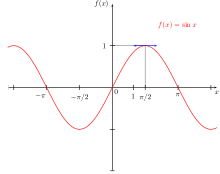ಟೆಂಪ್ಲೇಟು:Function/doc
| This is a documentation subpage for ಟೆಂಪ್ಲೇಟು:Function It may contain usage information, categories and other content that is not part of the original ಟೆಂಪ್ಲೇಟು page. |
{{Function
|name =
|image =
|heading1 = 1
|parity =
|domain =
|codomain =
|period =
|heading2 = 1
|zero =
|plusinf =
|minusinf =
|max =
|min =
|vr1 =
|f1 =
|vr2 =
|f2 =
|vr3 =
|f3 =
|vr4 =
|f4 =
|vr5 =
|f5 =
|heading3 = 1
|asymptote =
|root =
|critical =
|inflection =
|fixed =
|notes =
}}
Explanation:
- Pairs VR1-f1, f1-VR2, etc. are used for labeling specific value functions. Suppose a function at the point e has a value of 2e and that this point is because of something specific. In this case you should put that as VR1 = eand f1 = 2e. For the next point is used a couple of VR2-f2, etc. If you run out of points (five currently available), ask for more.
- Variables heading1, heading2, heading3 define whether some of the headlines basic properties, specific values, etc. be displayed. If you do not want a title to be displayed, simply delete the variable from the template. Set the value of the variable to 0 or anything will not prevent the display title.
- Variables plusinf and minusinf indicate the value function at + ∞ and - ∞.
- root is the x-intercept, critical is the critical point(s), inflection is inflection point(s)
- fixed is fixed point(s)
For example, the below produces the box to the right:
 | |
| Basic features | |
| Parity | odd |
| Domain | (-∞,∞) |
| Codomain | [-1,1] |
| Period | 2π |
| Specific values | |
| At zero | 0 |
| Maxima | ((2k+½)π,1) |
| Minima | ((2k-½)π,-1) |
| Specific features | |
| Root | kπ |
| Critical point | kπ-π/2 |
| Inflection point | kπ |
| Fixed point | 0 |
| Variable k is an integer. | |
{{Function
|name = Sine
|image = Sinus.svg
|heading1 = 1
|parity = odd
|domain = (-∞,∞)
|codomain = [-1,1]
|period = 2π
|heading2 = 1
|zero = 0
|plusinf =
|minusinf =
|max = ((2k+½)π,1)
|min = ((2k-½)π,-1)
|vr1 =
|f1 =
|vr2 =
|f2 =
|vr3 =
|f3 =
|vr4 =
|f4 =
|vr5 =
|f5 =
|heading3 = 1
|asymptote =
|root = kπ
|critical = kπ-π/2
|inflection = kπ
|fixed = 0
|notes =Variable k is an [[integer]].
}}